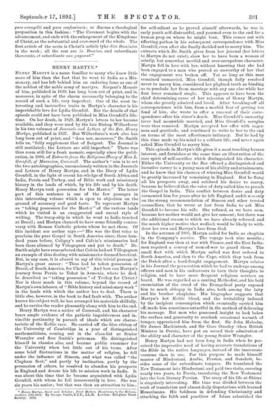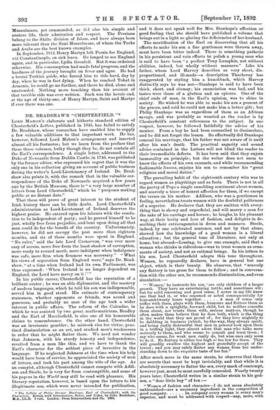HENRY AIARTYN.* HENRY MARTYN is a name familiar to many
who know little more of him than the fact that he went to India as a Mis- sionary, and has left behind him an enduring fame as one of the noblest of the noble army of martyrs. Sargent's Memoir of him, published in 1819, has long been out of print, and is, moreover, in spite of the charm necessarily belonging to the record of such a life, very imperfect. One of the most in- teresting and instructive traits in Martyn's character is his imperishable love for Lydia Grenfell. But the details of that episode could not have been published in Miss Grenfell's life- time. On her death, in 1829, Martyn's letters to her became available, and they were used by the late Bishop Wilberforce in his two volumes of Journals and Letters of the Rev. Henry Hartyn, published in 1837. But Wilberforce's work also has long been out of print, and "does not, moreover," Dr. Smith tells us, "fully supplement that of Sargent. The Journal is still mutilated ; the Letters are still imperfect." There was thus room still for a fresh memoir, especially since the publi- cation, in 1890, of Extracts from the Religious nary of Miss L. Grenfell, of Marazion, Cornwall. The author's "aim is to set the two autobiographies, unconsciously written in the Journals and Letters of Henry Martyn, and in the Diary of Lydia Grenfell, in the light of recent knowledge of South Africa and India, Persia and Turkey, and of Bible work and missionary history in the lands of which, by his life and by his death, Henry Martyn took possession for the Master." The latter part of this sentence is one of the few passages in this interesting volume which is open to objection on the ground of accuracy and good taste. To represent Martyn as "taking possession for the Master" of the various lands which he visited is an exaggerated and unreal style of writing. The troop-ship in which he went to India touched at Brazil ; and Martyn chanced to have some friendly contro- versy with Roman Catholic priests whom he met there. Of this incident our author says :—" His was the first voice to proclaim the pure Gospel in South America since, three hun- dred years before, Coligny's and Calvin's missionaries had been there silenced by Villegagnon and put to death." Dr. Smith might have remembered that Calvin had set Villegagnon an example of thus dealing with missionaries deemed heretical. But, in any case, it is absurd to say of this trivial passage in Martyn's great career : "Thus had he taken possession of Brazil, of South America, for Christ." And how can Martyn's journey from Persia to Tokat in Armenia, where he died, be described as "taking possession" of Turkey for Christ ? Nor is there much in this volume, beyond the record of Martyn's own labours, of "Bible history and missionary work" in the lands with which the author has to deal. There is little else, however, in the book to find fault with. The author knows his subject well, he has arranged his materials skilfully, and be carries the reader pleasantly along with him to the end.
Henry Martyn was a native of Cornwall, and his character bears ample evidence of the pathetic impulsiveness and in- vincible pertinacity in pursuit of ideals which are charac- teristic of the Keltic race. He carried off the blue ribbon of the University of Cambridge in a year of distinguished mathematicians, coming out in the class-list as Senior Wrangler and first Smith's prizeman. He distinguished himself in classics also, and became public examiner for the University when but little out of his teens. After some brief fluctuations in the matter of religion, he fell under the influence of Simeon, and what was called "the Clapham Sect," and partly by inclination, partly by the persuasion of others, he resolved to abandon his prospects in England and devote his life to mission work in India. It was about this time that he became acquainted with Lydia Grenfell, with whom he fell irrecoverably in love. She was six years his senior; but that was then an attraction to him ;
" Henry Martyn, Saint and Scholar ; First Modern Missionary to the Moham- medans, 1781-1812. By George Smith, C.LE., LLD. London : Itelgione Tract Society. 1E82.
for self-reliant as he proved nimself afterwards, he was in early youth self-distrustful, and yearned even to the end for a human prop on whom he might lean. This comes out with affecting pathos in his subsequent correspondence with Miss Grenfell, even after she finally decided not to marry him. The extracts which Dr. Smith gives from her journal (her letters to Martyn do not exist), show her to have been a woman of saintly, but somewhat morbid and over-scrupulous character. Martyn fell in love with her, without knowing that she had been engaged to a man who proved so unworthy of her that the engagement was broken off. Yet so long as this man remained unmarried, Miss Grenfell, though fully resolved never to marry him, considered her plighted troth so binding as to preclude her from marriage with any one else while her first lover remained single. This appears to have been the chief determining cause of her rejection of Henry Martyn, whom she greatly admired and loved. After breaking-off all correspondence with him, from a morbid fear of getting too fond of him, she wrote to offer a renewal of their corre- spondence after his sister's death. Miss Grenfell's unworthy lover had meanwhile married, and Miss Grenfell's scruples were thus removed. Martyn accepted her offer with eager- ness and gratitude, and continued to write to her to the end on terms of the most affectionate intimacy. But he had by this time made up his mind to a celibate life, and never again asked Miss Grenfell to marry him.
This episode in Martyn's life gives it a most touching human interest, and furnishes at the same time an illustration of the rare spirit of self-sacrifice which distinguished his character. Either the University or the Bar offered a distinguished and lucrative career to a young man of his ability and attainments, and he knew that his chances of winning Miss Grenfell would be greatly increased by remaining in England. But he flung all his prospects away, and subdued his desire to marry, because he believed that the voice of duty called him to preach the Gospel in India. This conflict between desire and duty tormented him for years after he left England, and it was only on the strong recommendation of Simeon and other trusted counsellors, that he wrote at last from India to ask Miss Grenfell to become his wife. She refused, as we have seen, because her mother would not give her consent ; but there was the additional reason to which we have already referred, and the much higher motive that wedlock would be likely to with- draw her own and Martyn's love from God.
In the autumn of 1805, Martyn sailed for India as chaplain in the Company's service. The voyage took nine months ; for England was then at war with France, and the East India- men required a convoy of men-of-war to guard them. The small fleet with which Martyn sailed was first ordered to South America, and then to the Cape, which they took from the Dutch after a hard-fought engagement. Martyn relates in his Journal the persecution which he had to undergo among officers and men in his endeavours to turn their thoughts to religion, and to have more frequent religions services on board. He was regarded as a canting Methodist, and his bold enunciation of the creed of the Evangelical party exposed him to much obloquy in India also, both among the laity and his brother chaplains. His biographer suggests that Martyn's hot Keltic blood, and the irritability induced by the incipient consumption which eventually carried him off, made him sometimes untactful in the method of delivering his message. But men who possessed insight to look below the surface and generosity to overlook occasional warmth of temper, appreciated him from the first. Sir John Malcolm, Sir James Mackintosh, and Sir Gore Onseley (then British Minister in Persia), bare put on record their admiration of the ability and character of the young Senior Wrangler.
Henry Martyn had not been long in India when he per- ceived the imperative need of having accurate translations of the Bible in the native languages, instead of the inaccurate versions then in use. For this purpose he made himself master of Hindustani, Arabic, Persian, and Sanskrit, be- sides some of the subordinate tongues. He translated the New Testament into Hindustani, and paid two visits, covering nearly two years, to Persia, translating the New Testament into the best literary Persian. The story of his life at Shiraz is singularly interesting. His time was divided between the work of translation and almost daily disputations with learned lldussulmans. His boldness in defending Christianity and attacking the faith and practices of Islam astonished the Mussulmans, yet commanded, as did also his simple and austere life, their admiration and respect. The Persians belong to the Shiite division of Islam, and have always been more tolerant than the Suni Mussulmans, of whom the Turks and Arabs are the best known examples.
In September, 1812, Henry Martyn left Persia for England, via Constantinople, on sick leave. He longed to see England again, and in particular, Lydia Grenfell. Bat it was ordained otherwise. II is consumption had made fatal progress, and the hardness of the journey brought on fever and ague. He had a brutal Turkish guide, who forced him to ride hard, day by day, when he was in fact dying. When he reached Tokat in Armenia, he could go no further, and there he died, alone and unattended. Nothing more touching than his account of that terrible ride was ever written. Such was the heroic end, at the age of thirty-one, of Henry Martyn, Saint and Martyr if ever there was one.



































 Previous page
Previous page